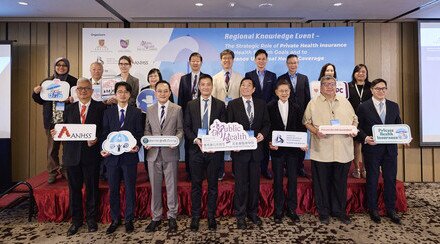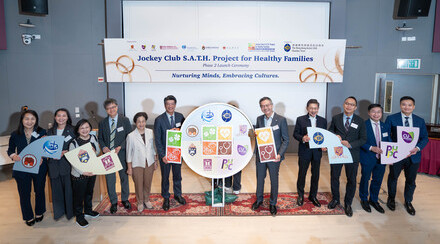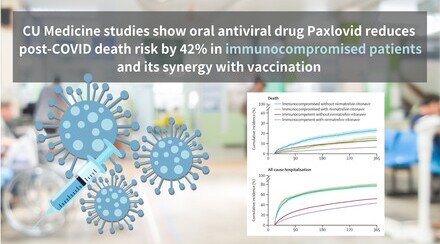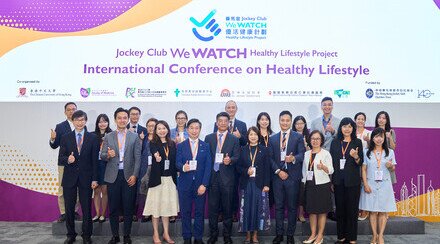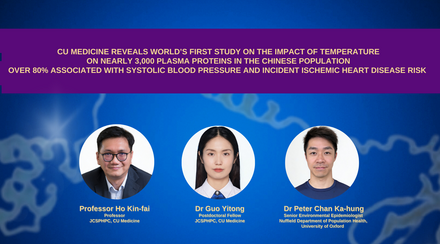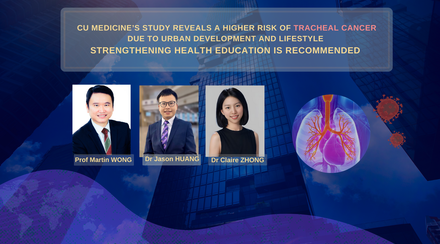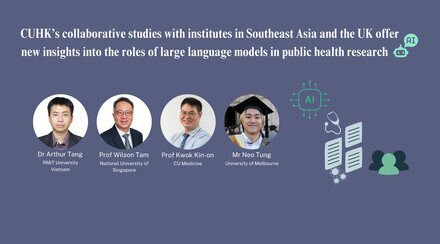Over 200 participants from more than 10 regions gather at CUHK to discuss health systems and community resilience lessons learnt during COVID-19
The COVID-19 pandemic presented global communities with an unprecedented crisis, characterised by its protracted and unpredictable nature, even in countries with well-established preparedness and response plans. In the recovery phase, it is crucial that the lessons learnt from country responses are synthesised to inform health system resilience policies and combat any future public health threat. The Centre for Health Systems and Policy Research (CHSPR) at the Jockey Club School of Public Health and Primary Care in The Chinese University of Hong Kong (CUHK)’s Faculty of Medicine (CU Medicine) organised a Regional Knowledge Event to underscore the significance of discussing health system and community resilience in the context of the pandemic.
The event was organised in collaboration with the Asia-Pacific Network for Health Systems Strengthening (ANHSS), a collaborative partnership established with the support of the World Bank Institute in 2009, bringing together over 200 participants and guests from more than 10 countries and areas. It provided a platform for senior policymakers, healthcare professionals and academics across the region to share experiences and insights on key strategies and innovations in responding to and controlling the pandemic, drawing upon global experiences.

Over 200 participants and guests from more than 10 countries and areas, including senior policymakers, healthcare professionals and academics across the region gather at CUHK to share experiences and insights on key strategies and innovations in responding to and controlling the pandemic, drawing upon global experiences.
Officiating guests of the opening of the Regional Knowledge Event included Professor the Hon Lo Chung-mau, Secretary for Health of the Hong Kong Special Administrative Region (HKSAR); Professor Francis Chan Ka-leung, Dean of CU Medicine, Professor Samuel Wong Yeung-shan, Director of The Jockey Club School of Public Health and Primary Care, and Professor Yeoh Eng-kiong, Director of the Centre of Health System and Policy Research at CU Medicine.
The event also featured a diverse group of esteemed speakers from across the Asia-Pacific region, including national and sub-national-level health policymakers such as Dr Ronald Lam, Director of Health of the Hong Kong Special Administrative Region; Dr Kerry Chant, Chief Health Officer in New South Wales, Australia, and her team; Professor Vernon Lee, Group Director, Communicable Diseases Group of the Ministry of Health, and Executive Director of the National Centre for Infectious Diseases in Singapore; and Dr Maria Endang Sumiwi, Director General of Public Health, Ministry of Health of Indonesia. They shared their expertise and insights on three main themes: (i) collaboration with communities in preparing for, responding to, mitigating and adapting to public health threats; (ii) lessons learnt in transforming health systems; and (iii) strategies for institutionalising the knowledge acquired to promote health system and community resilience.
.jpg)
Guests attending the opening ceremony include (from left) Professor Hung Chi-tim, Professor of Practice in Health Services Management, The Jockey Club School of Public Health and Primary Care at CU Medicine; Dr. Thomas Tsang; Dr. Su-vui Lo, Chief Executive Officer of the Hong Kong Genome Institute; Ms. Elke Leung, Representative of Golden Jubilee Charity Foundation; Ms. Ada Chung, The Privacy Commissioner for Personal Data, The Office of the Privacy Commissioner for Personal Data, HKSAR; Mr. Henry Fan, Chairman of the Hospital Authority; Professor Eng-kiong Yeoh, Director of Centre for Health Systems and Policy Research, The Jockey Club School of Public Health and Primary Care at CU Medicine; Professor the Hon Chung-mau Lo, Secretary for Health, Health Bureau, HKSAR; Ms. Shelley Lee, Convenor of Golden Jubilee Charity Foundation; Dr. Ronald Lam, Director of Health, Department of Health, HKSAR; Professor Samuel Wong, Director of The Jockey Club School of Public Health and Primary Care at CU Medicine; Mr. CK Fung, Representative of Golden Jubilee Charity Foundation; Dr. Edwin Tsui, Controller of Centre for Health Protection, Department of Health, HKSAR.
Professor Yeoh Eng-kiong, Director of the Centre of Health System and Policy Research at CU Medicine, said, “The Regional Knowledge Event engendered discussions on how the challenges brought by the COVID-19 pandemic led to enhancements in the preparedness, readiness and response of health systems during the pandemic, and provide invaluable lessons for enhancing health system resilience in the face of future public health threats.”
Professor Francis Chan Ka-leung, Dean of Medicine, said, “The Faculty of Medicine covers a wide spectrum of education and research, ranging from basic medical research to health policy and systems research. The latter focuses on the design of policy, implementation and evaluation, and engages with policy decision makers and societal stakeholders. The Regional Knowledge Event showcased the translation of evidence-based research into practical interventions, providing valuable insights to policymakers that allow them to formulate and implement effective pandemic control policies.”



